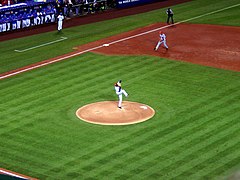| Revision as of 09:06, 3 February 2009 edit81.37.144.66 (talk) →External links← Previous edit | Revision as of 08:43, 13 February 2009 edit undoProlog (talk | contribs)Administrators42,638 editsm Reverted edits by 81.37.144.66 (talk) to last version by 71.181.135.128Next edit → | ||
| Line 83: | Line 83: | ||
| * | * | ||
| * | * | ||
| *''Havana Times,'' Feb 3, 2009 | |||
| ==References== | ==References== | ||
Revision as of 08:43, 13 February 2009
For information about the tournament held in 2006, see 2006 World Baseball Classic. For information about the upcoming 2009 tournament, see 2009 World Baseball Classic. For the "Baseball World Cup", see Baseball World Cup.| File:World Baseball Classic Logo with out text.pngThe World Baseball Classic logo | |
| Sport | Baseball |
|---|---|
| Founded | 2006 |
| No. of teams | 16 (Finals) |
| Continent | International |
| Most recent champion(s) | |
The World Baseball Classic, sometimes abbreviated WBC, is an international baseball tournament, first held in March 2006. It is sanctioned by the International Baseball Federation and created by Major League Baseball, the Major League Baseball Players Association, and other professional baseball leagues and their players associations around the world. The second WBC is scheduled to take place in 2009, with subsequent tournaments held every four years thereafter.
The WBC is the first international baseball tournament for national teams to feature professional players from the major leagues of North America and Japan; the Summer Olympics have regularly featured college and minor-league players because the Games conflict with the major league seasons in both regions, and the Baseball World Cup historically has not had major leaguers participate. In addition to providing a format for the best baseball players in the world to compete against one another while representing their home countries, the World Baseball Classic was created in order to further promote the game around the globe.
History

The tournament was announced in May 2005. Major League Baseball (MLB) had been attempting to create such a tournament for at least two years; negotiations with the Major League Baseball Players Association (MLBPA)—the players' union—and with the team owners had held the plan back. Owners, notably New York Yankees owner George Steinbrenner, had been concerned about their star players being injured in international play before the beginning of spring training, and the professional season. This was a concern for the union as well, but their primary objection was with drug testing: MLB wanted the stricter Olympic standards in place for the tournament, while the union wanted current MLB standards in place. Eventually, a deal was reached on insurance for player contracts and a fairly tough drug testing standard. MLB teams would not be able to directly block their players from participating.
Similarly, Nippon Professional Baseball (NPB) and its players' association had a disagreement over participation in the tournament. While the owners initially agreed to the invitation, the players' union was concerned about the time of year the tournament was scheduled to take place, as well as their right to be better represented when the next tournament is (presumably) to be held in 2009. After four months of negotiations, NPB officially notified MLB they were accepting the invitation on September 16, 2005.
Rules
A pitcher cannot pitch until
- a minimum of four days have passed since he last pitched, if he threw 50 or more pitches when he last pitched.
- a minimum of one day has passed since he last pitched, if he threw 30 or more pitches when he last pitched.
- a minimum of one day has passed since any second consecutive day on which the pitcher pitched.
A pitcher cannot pitch more than
- 65 pitches per game in Round One of the tournament.
- 80 pitches per game in Round Two of the tournament.
- 95 pitches per game in the Semifinals and Final of the tournament.
- A pitcher can still finish a batter's plate appearance even if the limit is reached, but must come out after completing the plate appearance.
A game will be a called game if the leading team is ahead by
- 10 or more runs when the opposing team has batted in at least seven innings.
- 15 or more runs when the opposing team has batted in at least five innings.
DH rule applies for all the games.
Results
| Year | Final Host | Final | Semifinalists | ||||||
|---|---|---|---|---|---|---|---|---|---|
| Champions | Score | Runners-up | 3rd place | 4th place | |||||
| 2006 Details |
San Diego |
Japan |
10-6 | Cuba |
South Korea |
Dominican Republic | |||
| 2009 Details |
Los Angeles |
||||||||
Future plans
As of 2008, plans call for the World Baseball Classic to be repeated every four years following the 2009 event, so the third installment of the Classic would not occur until 2013.
Other plans for the 2013 World Baseball Classic include possibly expanding the number of participating teams to 24 with qualifying rounds as a preface to reach the main competition.
In the 2013 World Baseball Classic, Bud Selig said that he may consider the Dominican Republic a candidate to host games.
External links
References
- Schwarz, A. "Baseball World Cup set for '06". retrieved from ESPN.com on February 24, 2007
- World Baseball Classic: About
See also
| World Baseball Classic | |
|---|---|
| Tournaments | |
| Qualification | |
| Finals | |
| Rosters | |
| Rules and statistics | |
| Trophy | |
| Related |
|
| |
| International baseball | ||
|---|---|---|
| WBSC Events |  | |
| Minor World Events | ||
| Defunct World Events | ||
| Africa | ||
| Americas | ||
| Asia | ||
| Europe | ||
| Oceania | ||